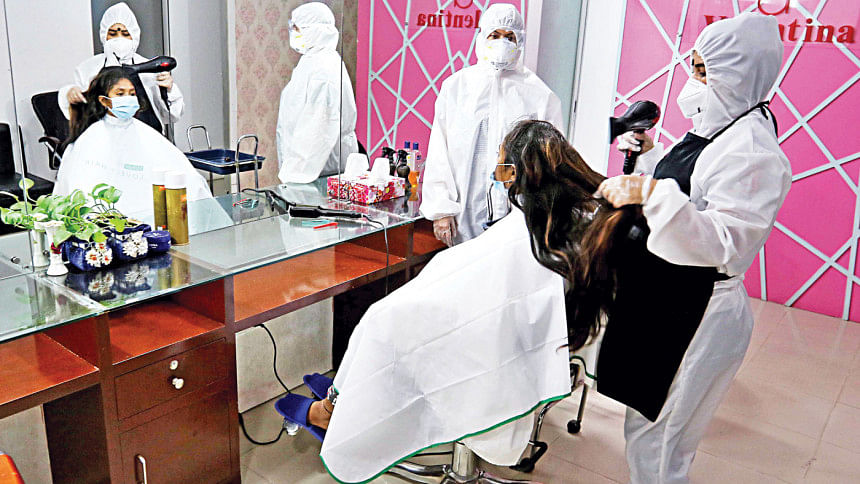No Eid joy for beauticians

Bobita Dalboth was supposed to stay busy with customers during this time of the year. Pre-Eid is the most profitable time for beauticians like her. On the busiest days, clients would have to line up and wait for their turn to get some last minute grooming done.
The revenue from this pre-Eid bonanza is a major boost for both owner and staff. Every year, Bobita waits to get Eid bonus with which she used to pay off her loans and shop for her family. For her employer, the profits meant business growth.
Not this year. In her 10 years of working, this is the first time Bobita is out of a job. Her husband used to work as a private car driver, but he too is out of work, and now the couple doesn't know how to provide for their daughter and son, let alone celebrate the Eid.
She has already racked up two months of unpaid house rent, totaling Tk 16,000. The family is now living on loans from acquaintances, which is only adding more stress for the future.
"I don't know how long I can survive in Dhaka. We might need to pack up and head for the village," said the Mohammadpur resident. "I was last paid for March. My employers said they will call me when business reopens. I was supposed to get a bonus (around Tk 20,000) for Eid, but now there's nothing at all," she said.
The beauty parlour sector in Dhaka is full of stories like Bobita's. Most staff are members of the Garo community, working to support their families back home. They live mostly in Mohammadpur, Old Dhaka, Farmgate and Nodda areas. The lack of income due to Covid-19 pandemic is putting the entire community in deep uncertainty.
Besides Bobita, this correspondent spoke to Topoti Ruram, a Garo beautician working in a parlour at Farmgate.
Out of work for two months, Topoti is now Tk 21,000 in debt for house rent at the grocery store.
"I thought I could clear the dues with Eid bonus; I don't know what to do," said Topoti.
The situation isn't any better for parlour owners. Besides a boost in income, sales during Eid helps them cover up losses round the year, which means the stoppage in business hurts doubly bad.
Arnika Chiran owns a beauty parlour in Uttara. Each month, she has to pay Tk 60,000 in rent and Tk 55,000 to her employees.
"I have three months' rent due. I was forced to send my beauticians back to villages. I gave them small amounts, but couldn't pay salaries since April," she said. "This hurts more because we are all from the same community."
"I used to earn nearly Tk four to five lakh every Eid," she said.
Initiatives to help Garo beauticians during the crisis have been sparse. Manusher Jonno Foundation organised a crowdfunding initiative to help 500 Garo beauticians. Community leaders are trying to raise funds, but said it is not possible without the government's help.
Subhajit Sangma, Nokma (chief) of Dhaka Wangala Celebration Committee, said, "We are trying to help our community by crowd-funding as well as by through NGOs. But unless the government comes forward, it won't be possible for the Garo community to survive this crisis."
Various local cooperatives are selling food packages at a minimal price to lower-income Garo families. However, this will not suffice, he added.

 For all latest news, follow The Daily Star's Google News channel.
For all latest news, follow The Daily Star's Google News channel. 



Comments